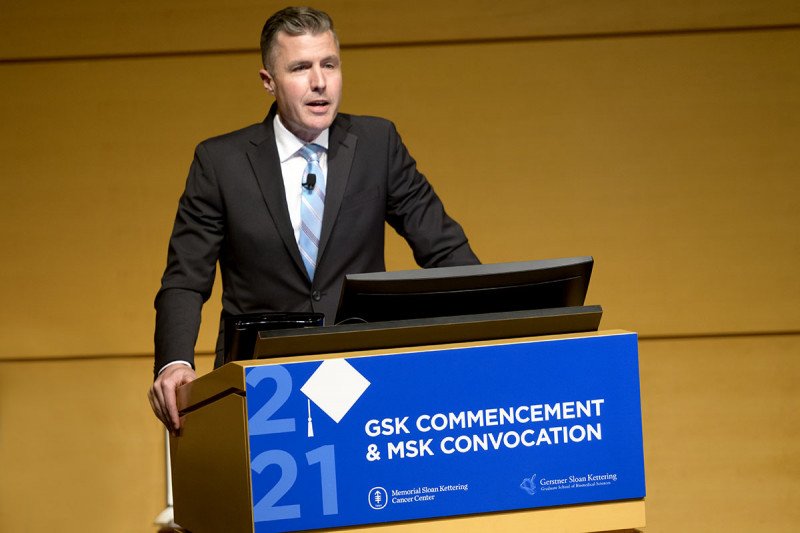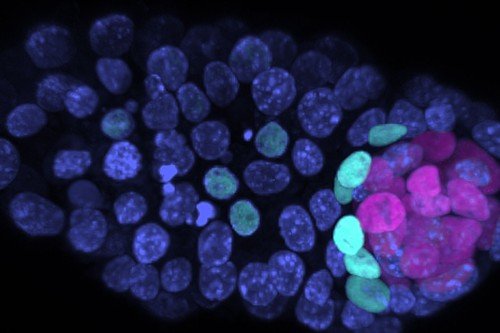
At MSK's 42nd annual Academic Convocation and Commencement ceremony, GSK Dean Michael Overholtzer praised graduates for their hard work and resiliency.
Memorial Sloan Kettering’s 42nd annual Academic Convocation and Commencement ceremony, which took place on May 19, 2021, was held virtually for a second year due to the COVID-19 pandemic. Four members of MSK’s leadership team took to the stage in the Zuckerman Research Center, where the event is traditionally held, while graduates from the Gerstner Sloan Kettering Graduate School of Biomedical Sciences (GSK) and other honorees watched from their homes or offices.
In addition to the seven graduates who received their PhD degrees from GSK this year, the ceremony also recognized 33 students graduating from the Sloan Kettering Division/Weill Cornell Graduate School of Medical Sciences who conducted their thesis research in MSK labs. The annual convocation and commencement ceremony is also a time to honor gifted trainees and distinguished scientists and doctors from MSK and beyond.
The commencement speaker this year was Joan Steitz, a Howard Hughes Medical Institute Investigator and the Sterling Professor of Molecular Biophysics and Biochemistry at Yale School of Medicine.
MSK President and CEO Craig B. Thompson began the ceremony by thanking his fellow speakers and mentioning all of the changes that have occurred at MSK — and elsewhere — since last year’s ceremony.
“Since that time, a lot has happened,” Dr. Thompson said. “Our labs have resumed their vital research operations and have made important contributions to basic biomedical research and cancer science.” He also noted all of the advances that have been made against COVID-19.
Additionally, Dr. Thompson discussed the ways in which many staff, students, and trainees have been affected by and involved in the social justice movements that have arisen in response to racism directed against Black and Asian Americans, adding, “MSK has taken important steps to ensure that we build an inclusive culture that embraces diversity. MSK is committed to increasing the recruitment of a more diverse faculty and student body.”
Honoring Top Researchers and Clinicians
Sloan Kettering Institute Director and GSK Provost Joan Massagué presented 15 awards for basic research to graduate students, postdoctoral fellows, and established members of the cancer research community.
MSK Physician-in-Chief and Chief Medical Officer Lisa DeAngelis presented the clinical research awards, including the Willet F. Whitmore Award for Clinical Excellence. Every year this award honors an MSK clinician for their talent, dedication, and compassion. In 2021, it went to medical oncologist Mark Kris, who has cared for lung cancer patients at MSK for more than four decades.
Dr. Kris has been a leader in the development of antinausea drugs, which have allowed many more patients to complete their chemotherapy treatments. He’s also been a pioneer in the development of targeted therapies for lung cancer.
“Today, we thank him for his devotion to his patients and the contributions his research has made to patients everywhere,” Dr. DeAngelis said. “We also thank him for dedicating himself to this institution, which has been truly privileged to have him on board.”
The Importance of Diversity in Research
Dr. Thompson then introduced Dr. Steitz, who received the Memorial Sloan Kettering Medal for Outstanding Contributions to Biomedical Science. She also was presented with an honorary degree from GSK.
Dr. Steitz is an innovator in the field of molecular biology. Her accomplishments have transformed the scientific understanding of RNA biology, including the function of ribosomes, which play a crucial role in protein synthesis, and spliceosomes, which help regulate protein assembly.
In discussing this research in what was once “an obscure corner of the field,” she said she never imagined that it would spawn a biotech industry that would make so many useful products. She mentioned applications for new drugs and diagnostics in particular, including mRNA vaccines for COVID-19.
Dr. Steitz told the graduates about an early turning point in her own career, when she was given her first independent research project. This set her on the path toward joining Harvard University’s graduate program in biochemistry and molecular biology — the first woman to do so.
Throughout her career, Dr. Steitz has been a leader in championing the cause of women in science. In her talk, she discussed the “pipeline problem” — despite men and women earning degrees in medicine and life science in equal numbers, “at each step up the academic ladder it’s more likely for a man than a woman to advance.” She emphasized the importance of diversity in the next generation of scientists for solving scientific challenges.
She concluded by telling the graduates, “It’s important to have goals. Always aim high. It’s important to do what you’re passionate about, and it’s important to enjoy what you’re doing.”
Honoring the Next Generation of Scientists
After Dr. Steitz completed her address, GSK Dean Michael Overholtzer delivered his remarks to the graduates. “To earn this degree in any time is a major achievement and one for which I offer my deepest congratulations,” he told them. “To have earned this degree in the unprecedented times that you have — and what a difficult year we’ve all had — has developed within you a resiliency that you will carry for the rest of your lives.”
Dr. Overholtzer then introduced a video in which the mentors of the seven GSK graduates praised their hard work and dedication and wished them well in their future careers.
At the conclusion of the event, Dr. Thompson also congratulated the degree recipients. Then a video of the graduates moving their tassels from the right side to the left was played. After the ceremony concluded, in place of the traditional reception, the graduates were invited to have a video chat with Dr. Steitz.
Recognizing Important Accomplishments
During the ceremony, awards were presented to other investigators within the MSK community:
- Bryce Delgado, a graduate student in Stephen Long’s lab, and Anjana Krishnamurthy, a graduate student in Alexandra Joyner’s lab, received Dorris J. Hutchison Fellowships.
- Yaniv Kazansky, a graduate student in Alex Kentsis’s lab, and Yilun Ma, a graduate student in Richard White’s lab, received Barbara and Stephen Friedman Fellowship Awards.
Meet Regina Bou Puerto, the 2021 Kravis WiSE Graduate Fellowship Winner
- Miguel Francisco de Jesus, a student who is doing his thesis research in Morgan Huse’s lab, and Katrina Paras, a student doing her research in Lydia Finley’s lab, received Bruce Charles Forbes Fellowship Awards.
- Postdoctoral fellows Alvin Makohon-Moore of Christine Iacobuzio-Donahue’s lab, Colleen Lau of Joseph Sun’s lab, and William Yewdell of Jayanta Chaudhuri’s lab received Postdoctoral Research Awards.
- The recipients of this year’s Marie-Josée Kravis Women in Science Endeavor awards were Regina Bou Puerto, a graduate student in Alexander Rudensky’s lab, and Mijin Kim, a postdoctoral fellow in Daniel Heller’s lab.
- Wouter Karthaus of Charles Sawyers’s lab and Cornelius Taabazuing of Daniel Bachovchin’s lab received Tri-Institutional Breakout Prizes for Junior Investigators.
Meet Mijin Kim, the 2021 Kravis WiSE Postdoctoral Fellowship Winner
- Dr. Bachovchin, of the Chemical Biology Program, received the Louise and Allston Boyer Young Investigator Award for Basic Research.
- Vinod Balachandran, a surgeon who also heads a research lab in the Human Oncology and Pathogenesis Program, received the Boyer Clinical Research Award.
The 2021 honorees from outside MSK were:
- Ruslan Medzhitov, the Sterling Professor of Immunobiology at Yale School of Medicine, received the Katharine Berkan Judd Award. Dr. Medzhitov delivered the Judd Award lecture on May 18.
- Stephen Fesik, the Orrin H. Ingram II Chair in Cancer Research Professor of Biochemistry, Pharmacology, and Chemistry at Vanderbilt University, received the C. Chester Stock Award. Dr. Fesik delivered the Stock Award lecture on May 19.
- A. Thomas Look, a professor of pediatrics at Harvard Medical School and Vice Chair for Research in the Department of Pediatric Oncology at Boston Children’s Hospital, received The Society of Memorial Sloan Kettering Prize, which recognizes individuals who have made significant or groundbreaking contributions to pediatric oncology. Dr. Look presented his award lecture as part of Pediatric Grand Rounds on May 20.







